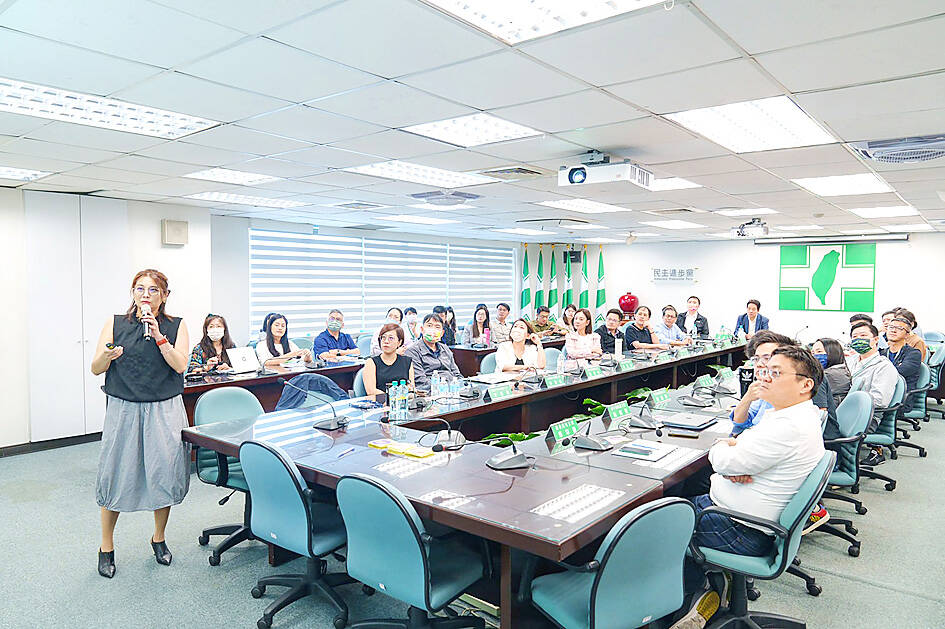The Executive Yuan yesterday said it plans to submit draft amendments to the Gender Equity Education Act (性別平等教育法), the Gender Equality in Employment Act (性別工作平等法) and the Sexual Harassment Prevention Act (性騷擾防治法) to the Legislative Yuan next month.
The proposed amendments come amid a wave of allegations of sexual misconduct against local political, media and social figures.
The Cabinet said that the amendments would focus on the definition of what constitutes sexual harassment and developing a better reporting mechanism.

Photo courtesy of DPP headquarters via CNA
The amendments would address employers’ responsibility regarding sexual misconduct, as current laws only provide guidance on preventing such incidents, Cabinet officials said.
Current laws stipulate that only companies with more than 30 employees are required to set up measures to prevent and report sexual misconduct in the workplace, leaving workers in small and medium-sized enterprises — the bulk of businesses in Taiwan — with no avenue to seek formal redress, the officials said.
The amendments would require more companies to establish their own formal reporting and punishment mechanisms, as well as shorten the period granted to address such complaints, the officials said.
Earlier this month, President Tsai Ing-wen (蔡英文) said she had tasked Premier Chen Chien-jen (陳建仁) with leading a government review of the issue.
Apologizing for the DPP’s mishandling of sexual misconduct complaints, Tsai said that sexual harassment was a problem in all facets of life and society.
The draft amendments would be sent to the Legislative Yuan around the middle of next month, Cabinet spokesperson Lin Tze-luen (林子倫) said.
Cabinet officials said the reforms would be based on consultations with experts and existing international laws such as the International Labour Organization’s Violence and Harassment Convention.

An essay competition jointly organized by a local writing society and a publisher affiliated with the Chinese Communist Party (CCP) might have contravened the Act Governing Relations Between the People of the Taiwan Area and the Mainland Area (臺灣地區與大陸地區人民關係條例), the Mainland Affairs Council (MAC) said on Thursday. “In this case, the partner organization is clearly an agency under the CCP’s Fujian Provincial Committee,” MAC Deputy Minister and spokesperson Liang Wen-chieh (梁文傑) said at a news briefing in Taipei. “It also involves bringing Taiwanese students to China with all-expenses-paid arrangements to attend award ceremonies and camps,” Liang said. Those two “characteristics” are typically sufficient

A magnitude 5.9 earthquake that struck about 33km off the coast of Hualien City was the "main shock" in a series of quakes in the area, with aftershocks expected over the next three days, the Central Weather Administration (CWA) said yesterday. Prior to the magnitude 5.9 quake shaking most of Taiwan at 6:53pm yesterday, six other earthquakes stronger than a magnitude of 4, starting with a magnitude 5.5 quake at 6:09pm, occurred in the area. CWA Seismological Center Director Wu Chien-fu (吳健富) confirmed that the quakes were all part of the same series and that the magnitude 5.5 temblor was

The brilliant blue waters, thick foliage and bucolic atmosphere on this seemingly idyllic archipelago deep in the Pacific Ocean belie the key role it now plays in a titanic geopolitical struggle. Palau is again on the front line as China, and the US and its allies prepare their forces in an intensifying contest for control over the Asia-Pacific region. The democratic nation of just 17,000 people hosts US-controlled airstrips and soon-to-be-completed radar installations that the US military describes as “critical” to monitoring vast swathes of water and airspace. It is also a key piece of the second island chain, a string of

The Central Weather Administration has issued a heat alert for southeastern Taiwan, warning of temperatures as high as 36°C today, while alerting some coastal areas of strong winds later in the day. Kaohsiung’s Neimen District (內門) and Pingtung County’s Neipu Township (內埔) are under an orange heat alert, which warns of temperatures as high as 36°C for three consecutive days, the CWA said, citing southwest winds. The heat would also extend to Tainan’s Nansi (楠西) and Yujing (玉井) districts, as well as Pingtung’s Gaoshu (高樹), Yanpu (鹽埔) and Majia (瑪家) townships, it said, forecasting highs of up to 36°C in those areas